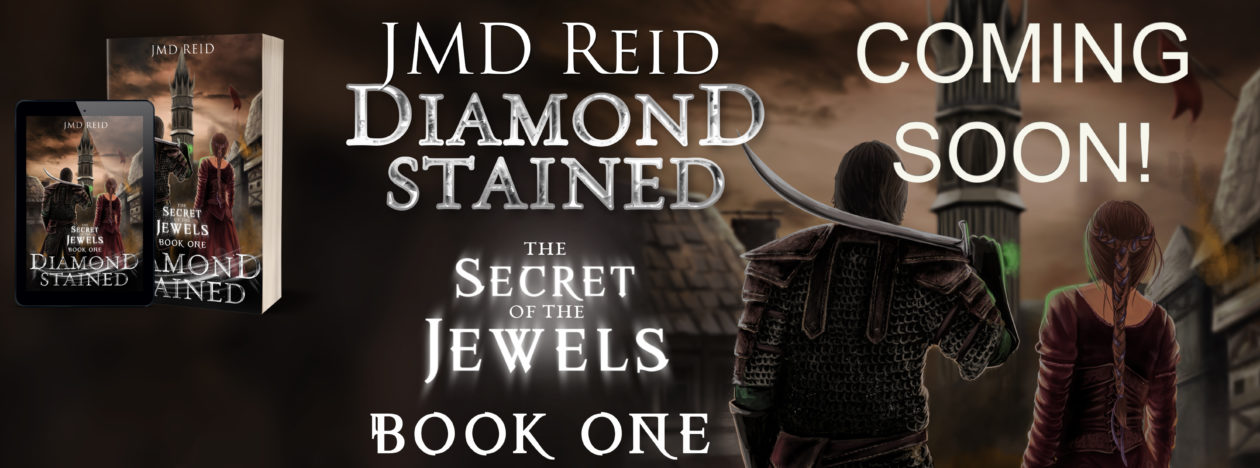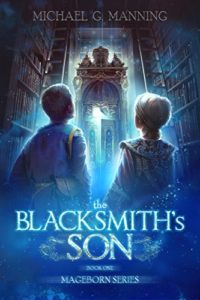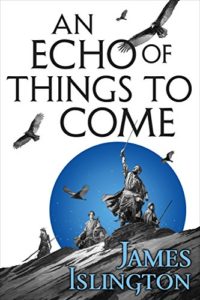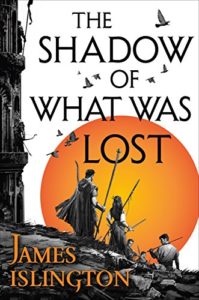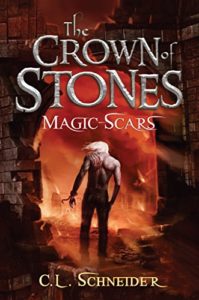Reread of Prince of Nothing Trilogy
Book 1: The Darkness that Comes Before
by R. Scott Bakker
Prologue
The Wastes of Kûniüri
If you missed out on the introduction to the series, click here.
Section 1
“It is only after that we understand what has come before, then we understand nothing. Thus we shall define the soul as follows: that which precedes everything.”
—Ajencis, the Third Analytic of Men
My thoughts
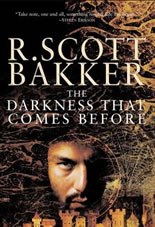 Bakker opens every chapter with quotes from various fictitious philosophers, historians, or folk sayings of his world. To me, Ajencis is saying the cause of man’s actions is the soul. To understand men’s actions we need to understand the soul. Another reference, I believe, to the title of the book. The cause that comes out of the “darkness” is the soul.
Bakker opens every chapter with quotes from various fictitious philosophers, historians, or folk sayings of his world. To me, Ajencis is saying the cause of man’s actions is the soul. To understand men’s actions we need to understand the soul. Another reference, I believe, to the title of the book. The cause that comes out of the “darkness” is the soul.
Bakker is a philosopher in the field of human consciousness (read his treaties on thought, they are dense and make my head spin), in his series the soul is a very real phenomenon that he will explore over the course of the books.
2147 Year-of-the-Tusk, the Mountains of Demua
The prologue begins in the citadel of Ishuäl. Months earlier, High King Anasûrimbor Ganrelka II fled here with the remnants of his household. Here they thought they would be safe and survive the end of the world. They were wrong.
“The citadel of Ishuäl succumbed during the height of the Apocalypse. But no army of inhuman Sranc had scaled its ramparts. No furnace-hearted dragon had pulled down its might gates. Ishuäl was the secret refuge of the Kûniüric High Kings, and no one, not even the No-God, could besiege a secret.”
Ganrelka was the first to die of plague. Followed by his concubine and her daughter. It burned though the fortress, claiming the lives of mighty knights, viziers, and servants. Only Ganrelka’s bastard son and a Bardic Priest survived.
The boy hid from the Bard, terrified of his strange manner and one white eye. The Bard pursued the boy and one night caught him. Crying and pleading for forgiveness, the Bard raped the boy. Afterward the Bard mumbled, “There are no crimes, when no one is left alive.” Five nights later, the boy pushed the Bard from the walls. “Was it murder when no one was left alive?”
Winter came and wolves howled in the forest beyond the walls. The boy survived alone in the fortress. When the snows broke, the boy heard shouts at the gate and found a group of refugees of the Apocalypse. The refugees scaled the walls and the boy hid in the fortress. Eventually, one of the refugees found him.
With a voice neither tender nor harsh, he said: “We are Dûnyain, child. What reason could you have to fear us?”
But the boy clutched his father’s sword, crying, “So long as men live, there are crimes!”
The man’s eyes filled with wonder. “No, child,” he said. “Only so long as men are deceived.”
For a moment, the young Anasûrimbor could only stare at him. The solemnly, he set aside his father’s sword and took the stranger’s hand. “I was a prince,” he mumbled.
The boy was brought to the refugees and together they celebrated. In Ishuäl they had found shelter against the end of the worlds. The Dûnyain buried the dead with their jewels and fine clothes, destroyed the sorcerous runes on the walls, and burned the Grand Vizier’s books. “And the world forgot them for two thousand years.
Thoughts
“One cannot raise walls against what has been forgotten.” Bakker opens the book with a warning about the need to remember. The importance of keeping and remembering history is a prevalent theme in the series. From the Dûnyain deliberately forgetting about the outside world, to the world forgetting about the Apocalypse. And, of course, the world forgetting about the Dûnyain for two thousand years.
Bakker then starts to give us hints of the Apocalypse that dominates the rest of the series. Of cities burning, dragons, and inhuman Sranc. This Apocalypse is so terrible that not just any king, but a High King has fled it and written off the world as lost. Now just hopes to survive. And finally the sadness that even in this refuge, they almost all die anyway.
Bakker displays in this section his ability to paint events in a historical context. His books change from the tight focus, limited third person POV common in most of Fantasy today, allowing you to get into the thoughts of a single character in any scene to vast, more omniscient third person sections where he tells the events of the story almost as a bard reciting the story of history. Not a dry text book, but a vibrant story that keeps you interested.
In the description of Ganrelka’s retainers as they die, we get hints about the world and the Apocalypse. Bakker doesn’t dump his world building on us, but teases us with names that are almost familiar. The five Knights of Tyrsë who saved Ganrelka’s after the catastrophe on the Fields of Eleneöt. The Grand Vizier who dies upon sorcerous text. Ganrelka’s unnamed uncle, “who led the heartbreaking assault on Golgotterath’s gate.” Golgotterath resembles Golgatha where Jesus was crucified. When I read this name, I always picture something like the Black Gate of Mordor with skulls.
Bakker is skilled at using the familiar trappings of Fantasy, whose modern roots extend from Tolkien It roots the reader in the familiar while his style and story clearly deviates from anything you would read in Lord of the Rings.
Without showing us a single scene of the Apocalypse, Bakker still conveys the horror of it. After showing large scale horror, Bakker narrows his focus to the Boy. Left alone, he is preyed upon by an adult. Nietzsche’s philosophy at work here. Humans are selfish creatures who pursue their own desires and its only the fear of the consequences that keep us from acting upon all of them. Whether fear of a higher power, fear of a temporal power, or just the fear of the opinion of others. Once those are removed, there are no crimes any longer.
And finally, the Dûnyain arrive. Another group of refugees who fled the Apocalypse. The Dûnyain have rejected the gods. They deliberately destroy there history and anything connected to the supernatural. They bury all the wealth and trappings of power. They have survived the Apocalypse and decide to reject the former world they come from. As they say, “Here awareness most holy could be tended.”
Section 2
Nonmen, Sranc, and Men:
The first forgets,
The third regrets,
And the second has all of the fun.
—Ancient Kûniüri nursery rhyme
This is a history of a great and tragic holy war, of the mighty factions that sought to possess and pervert it, and of a son searching for his father. And as with all histories, it is we, the survivors, who will write its conclusion.
—Drusas Achamian, Compendium of the First Holy War
My thoughts
These two quotes began the second, much longer part of the prologue. Nonmen is one my favorite names for the “elf” race in a fantasy series. It also informs us about the most important part of a Nonman, they forget. Regret is definitely a large part of being human. And of course, Sranc just want to have fun—and by fun I mean murder and brutal rape.
The second quote is from a book written after the events of the Prince of Nothing trilogy and gives us a plot summary of what the overt plot Prince of Nothing series is about. The First Holy War is the obvious story, the one on which the true story hides in the shadows. The Compendium is written by Achamian, one of the main characters, and often a segment is before each chapter, teasing you about events that are up coming. The downside is you never can believe Achamian is in real danger because he has to survive the Holy War to write about it. But it does serve to keep you reading.
Now who is the son? Well, we’re about to find out.
Late Autumn, 4109 Year-of-the-Tusk, the Mountains of Demua
The section begins with dreams coming to a group of men. Dreams of clashes of culture, glimpses of history, and of a holy city—Shimeh. A voice “thin as though spoken through the reed of a serpent, saying ‘Send to me my son.‘” The dreamers follow the protocol they established after the first dream and meet in the Thousand Thousand Hall and decided that such desecration could not be tolerated.
The narrative shifts to Anasûrimbor Kellhus, transitioning to a limited, third person POV. He is on a mountain trail looking back at the monastic citadel of Ishuäl. He sees the elder Dûnyain abandoning their vigil. These Elders have been polluted by the dreams sent by Kellhus’ father. The Elders would die in the great Labyrinth beneath Ishuäl.
Kellhus has been sent alone on a mission. As he descends into the wilderness of Kûniüri, he wonders how many vistas he would cross before seeing his father at Shimeh. As he enters the forest he finds himself unnerved. He attempts to regain his composure using “ancient techniques to impose discipline on his intellect.” He wonders if this is the first trial. Kellhus is awed by the beauty of the natural world. “How could water taste so sweet. How could sunlight, broken across the back of rushing water, be so beautiful?”
What comes before determines what comes after. Dûnyain monks spent their lives immersed in the study of this principle, illuminating the intangible mesh of cause and effect that determined every happenstance and meaning all that was wild and unpredictable. Because of this, events always unfolded with granitic certainty in Ishuäl. More often than not, one knew the skittering course a leaf would take through the terrace groves. More often than not, one knew what another would say before he spoke. To grasp what came before was to know what would come after. And to know what would come after was the beauty stilled, the hallowed communion of intellect and circumstance—the gift of the Logos.
This mission was Kellhus’s first surprise. His childhood was strict ritual, study, and conditioning. Out of Ishuäl he is constantly barraged by new sights, sensations, and creatures. His mind, trained to drink in stimuli in the controlled environment of his home, is overwhelmed by the chaos of the natural world. For more than a month he wanders south through the foothills of Demua. He stops talking care of himself or his gear as the endless walk continues. On his 43rd day he comes across an immense valley dotted with ruins.
Kellhus explores the ruins. They are ancient, overgrown by the forest. Kellhus wanders who were the men who built this place. Bending to drink from a pool, he sees his unshaven face reflected in the water
Is this me?
He studied the squirrels and those birds he could pick from the dim confusion of the trees. Once he glimpsed a fox slipping through the brush.
I am not one more animal.
His intellect flailed, found purchase, and grasped. He could sense wild cause sweep around him in statistical tides. Touch him and leave him untouched.
I am a man. I stand apart from these things.
As evening waxed, it began to rain. Through branches he watched the clouds build chill and gray. For the first time in weeks, he sought shelter.
Kellhus continues his journey but his supplies begin to dwindle. He set out with as much as he could carry. Hunger and exposure begin to take their toll of Kellhus. The snows come and Kellhus could finally walk no farther. “The way is to narrow, Father. Shimeh to far.”
Kellhus is found by a trapper named Leweth and his sled dogs. Kellhus is half buried by the snow and barely alive. Leweth takes Kellhus to his home and cares for him through the winter.
Neither Kellhus or Leweth speak the same language. Kellhus picks up the basics and begins to communicate with Leweth. Kellhus learns he is the lands of Sobel, the northernmost province of the ancient city of Atrithau. Sobel has been abandoned for generations, but Leweth prefers the isolation.
Though Leweth was a sturdy man of middle years, for Kellhus he was little more than a child. The fine musculature of his face was utterly untrained, bound as though by strings to his passions. Whatever moved Leweth’s soul moved his expression as well, and after a short time Kellhus needed only to glance at his face to know his thoughts. The ability to anticipate his thoughts, to re-enact the movements of Leweth’s soul as though they were his own, would come later.
A routine forms between the two men, with Kellhus helping with chores to “earn his keep.” Kellhus studies Leweth during this time and learns that through small labors Leweth learned patience. The only times his hands were still was when he slept or was drunk. Leweth would drink all day, and by the end become drunk. While Kellhus learned much from observing drunk Leweth, he decides a sober Leweth would be more useful. While Leweth is passed out, Kellhus dumps out all his whiskey.
After Leweth’s painful detox, they discuss old pains. Leweth came to the wilderness after the death of his wife in Atrithau. Kellhus observes that Leweth pretends to morn to secure pity. Leweth lies to himself about why he came out here. That Atrithau reminds him or his wife. He even believes his family and neighbors secretly hated her and are glad she is dead. This forced Leweth to flee to the forest.
Why does he [Leweth] deceive himself this way?
“No soul moves alone through the world, Leweth. Our every though stems from the thoughts of others. Our every word is but a repetition of words spoken before. Every time we listen, we allow the movements of another soul to carry our own.” He paused, cutting short his reply in order to bewilder the man. Insight struck with so much more force when it clarified confusion. “This is truly why you fled to Sobel, Leweth.”
Leweth fled Sobel so he could hold onto the ways his wife moved his soul—he fled to remember. Kellhus confronts Leweth with this truth. Kellhus does this to posses Leweth, but lies and says its because Leweth has suffered enough. They argue, but because Kellhus can predict Leweth’s reaction, he guides the argument in his own favor. In the end, Leweth breaks down and cries.
“I know it hurts, Leweth. Release from anguish can be purchased only through more anguish.” So much like a child …
“W-what should I do?” the trapper wept. “Kellhus … Please tell me!”
Thirty years, Father. What power you must wield over men such as this.
And Kellhus, his bearded face warm with firelight and compassion, answered. “No one’s soul moves alone, Leweth. When one love dies, one must learn to love another.”
Once Leweth regains his composure, the continue their conversation. Through his Dûnyain training, Kellhus could control the “legion of faces” that live within him. He can fake any emotional response with the same ease he can craft words. Pretending to happy and compassionate, Kellhus continues his cold scrutiny of Leweth.
Kellhus is disdainful of Leweth’s superstitions of gods and demons. To Leweth, finding Kellhus was fate. Leweth asks Kellhus why the gods sent him. Kellhus tells him of his mission to find his father Anasûrimbor Moënghus. Moënghus left when Kellhus was a child and has now summoned him to Shimeh. Leweth asks how that is possible since Shimeh is so far away and Kellhus answers through dreams. Leweth thinks sorcery explains the dreams. Kellhus doesn’t think that is possible. He dismiss Leweth’s talk of sorcerers and priests, of witches and demons.
Superstition. Everywhere and in everything, Leweth had confused that which came after with that which came before, confused the effect for the cause. Men came after, so he placed them before and called them “gods” or “demons.” Words came after, so he placed them before and called them “scriptures” or “incantations.” Confined to the aftermath of events and blind to the causes that preceded him, he merely fastened upon the ruin itself, men and the acts of men, as the model of what came before.
But what came before, the Dûnyain had learned, was inhuman.
There must be some other explanation. There is no sorcery.
Leweth tells Kellhus about Shimeh. It is a holy city far to the south in the Three Seas. Leweth doesn’t know much about the nations of the Three Seas since the Sranc controlled the lands of the north save for Atrithau and Sakarpus. What Leweth knows is they were young lands when the north was destroyed by the No-God and the Consult. The only contact between Atrithau and the Three Seas is by a yearly caravan. Shimeh is holy city in the hands of heathens. In Atrithau, Kellhus could secure the means of reaching Shimeh. Only after the trapper tells Kellhus everything, does he let him sleep.
Near the cabin, Kellhus finds an ancient stone stele with runes upon it. In Kellhus’s own language it records the deeds of Anasûrimbor Celmomas II. Kellhus had dismissed Leweth’s talk of the apocalypse as superstition, but the stone proves the world is far older the Dûnyain. On one of these trips he notices strange tracks in the snow.
Kellhus informs Leweth of the tracks, and in horror, Leweth says they are Sranc. Leweth is amazed the Kellhus can be from the north and not no what those tracks mean. Leweth explain the Sranc will eat anything, but they enjoy to hunt men to “calm the madness of their hearts.” The Sranc have found them, and Kellhus and Leweth flee.
A small group Sranc catch them. Kellhus stays to fight the Sranc and tells Leweth to keep fleeing. In amazement, Leweth watches Kellhus charge the Sranc and kill them “like a pale wraith through the drifts.” Then Leweth is injured by an arrow.
Another group of Sranc are killing Leweth’s dogs. Leweth wants to save them but Kellhus grabs his arm and half drags Leweth. Eventually, Leweth’s strength fails him and Kellhus questions him on the way to go to get to safety. Leweth answers and Kellhus abandons Leweth to the Sranc. Leweth sobs in disbelief as he watch Kellhus, a man he has come to love and worship, disappear into the woods. But for the calculating Kellhus, the decision to abandon Leweth is simple—he has no further use for him.
Kellhus leaves the forest and climbs a hill. The Sranc have caught him. Before the ruins of a wall and gate, Kellhus makes his stand. They fired arrows at him. Calmly, he plucks one out of the air and examines it. In a rush they come at him and he “speared the ecstasy from their inhuman faces.”
They could not see that circumstance was holy. They only hungered. He, on the other hand, was one of the Conditioned, Dûnyain, and all events yielded to him.
The Sranc fall back. For a moment they surrounded him and Kellhus faces their menace with tranquility. They flee. One dying on the ground hisses something in an unknown language. Kellhus wanders what these creatures are.
More Sranc come, led by a figure on a horse. The figure wears a cloak stitched with abstract faces. In Kûniüric, the figure praises Kellhus and asks his name. Anasûrimbor Kellhus, he answers. The figure thinks he is being mocked, but then sees the resemblance in Kellhus’s face.
Kellhus studies the figure and realizes the cloak is made from skinned faces, stretched flat and sewn together. The figure is powerfully built, heavily armored, and unafraid. “This one was not like Leweth. Not at all.”
The figure is surprised that a mortal is not afraid of him. Fear is what separates the figure from humans. Kellhus mocks the figure, trying to bait him and is surprised by the figures reaction.
Kellhus’s provocation had been deliberate but had yielded little—or so it seemed at first. The stranger abruptly lowered his obscured face, rolled his head back and forth on the pivot of his chin, muttering, “It baits me! The mortal baits me … It reminds me, reminds …” He began fumbling with his cloak, seized upon a misshape face. “Of this one! Oh, impertinent—what a joy this was! Yes, I remember …” He looked up at Kellhus and hissed, “I remember!”
And Kellhus grasped the first principle of this encounter. A Nonman. Another of Leweth’s myths come true.
The Nonman points to a dead Sranc and says this one was his elju (book). He laments the Sranc’s death, although they are vicious creatures, they are “most…memorable.” Kellhus sees an opening, and presses the Nonman. The Nonman reveals that while the Sranc are their children now, before humans were. He was a companion to the great Norsirai kings and enjoyed the humans childish squabbles (wars). But as time passed, some Nonmen need more exquisite brutality than humans can provide to remember. This is the great curse of the Nonman.
“I am a warrior of ages, Anasûrimbor … ages. I have dipped my nimil in a thousand hearts. I have ridden both against and for the No-God in the great wars that authored this wilderness. I have scaled the ramparts of Golgotterath, watched the hearts of High Kings break for fury.”
“Then why,” Kellhus asked, “raise arms now, against a lone man?”
Laughter. The free hand gestured to the dead Sranc. “A pittance, I agree, but still you would be memorable.”
They fight, trading blows. Kellhus fends off the Nonman blows, but his weapon own cannot penetrate the Nonman’s armor. The Nonman is surprised at Kellhus ability. Kellhus sword slashes the Nonman’s chin open. The Nonman is disarmed, on his back, Kellhus sword at his face. Kellhus begins to interrogate the Nonman.
The Nonman speaks a word and Kellhus is thrown back by incandescent. The Nonman rises up into the air. Confronted with sorcery, Kellhus flees into the forest. Behind him are explosions and fire. An unearthly voice yells his name. “RUN, ANASÛRIMBOR! I WILL REMEMBER!” Kellhus runs faster than he had before the Sranc and wonders if sorcery is one of the lessons from his father.
My Thoughts
When we first meet Kellhus he seems like a traditional hero of a fantasy journey. The quintessential character to go on the Campbellian Heroic Journey. A young man leaving home for the first time on a quest who is the unknowing descendant of kings. However, there are differences between Kellhus’s and the Hero’s Journey. While Kellhus has answered the Call of Adventure, he never Refuses the Call. Kellhus upbringing and training have left him with no doubt. This is his mission, and he will accomplish it.
The wilderness is not kind to Kellhus. The isolation and toil reduces Kellhus to a beast with only one thing on his mind: reaching Shimeh. Eventually, Kellhus realizes this and overcomes the Crossing of the First Threshold and becomes a man again.
Kellhus’s time with Leweth is where we see the products of Dûnyain training. They have embraced Nietzsche’s philosophy. These are the übermench he wrote of. They have trained their bodies and minds past the normal human limits. They have made of study of passions and have learned how to control their emotions. Kellhus listens to Leweth’s story about his dead wife and never once feels anything. Neither pity or compassion. Kellhus uses truth to make Leweth his slave and once Leweth is of no further use, abandons him to death without a second thought. The Dûnyain embody the Will to Power and have no morality to temper their methods. Kellhus will do anything to accomplish his mission.
Kellhus is a sociopath. To contrast Leweth and Kellhus: when Leweth first finds Kellhus in the snow, he thinks food for his dogs. Meat was scarce in the north. However, Leweth’s humanity cause him to show Kellhus compassion,. Leweth cares for Kellhus, using his own scarce resources.
We seen more of Kellhus’s abilities against the Sranc. He reminds me a lot of Bene Gesserit of Frank Herbert’s Dune series. Their bodies are so under their control and their ability to read the movement of their enemies makes them almost invincible. Kellhus has a lot similarities to Paul Muad’dib. However, Paul’s abilities was tempered with emotions.
When Kellhus plucks the arrow out of the air, I recognized him as a D&D Monk (it’s a common ability the player class monks get). The setting of these books were originally Bakker’s D&D campaign he created. The Nonmen are elves, the Sranc are orcs, etc. Bakker also draws a lot on Tolkien. I read somewhere on the internet that the Second Apocalypse is Tolkien done with Nietzschean philosophy, and that is not far off. But only in the broad strokes does this series follow the Lord of the Rings. Take the sexual imagery that is used to describe the Sranc. It is the first hint about the nature of their creators.
Finally, Kellhus confronts the Nonman. A race so long lived, they forget, only remembering the bad stuff. No wonder the Nonman (revealed by Bakker to be Mekeritrig) seems slightly mad. You can see the delight the Nonman has at finding such a memorable man as Kellhus. He is really looking forward to the fight.
Bakker’s description of sorcerery is always very minimal and ethereal. He uses phrases like “petals blowing from a palm” and “pale watery light.” The Dûnyain rejection of the supernatural have left Kellhus without the training on how to deal with it. There is no pride that holds back Kellhus decision to flee. It is instantaneous. He has determined he has no chance of winning and the only option is flight. Even then, his mind is still working normally, cataloging the event and shifting his world view. Kellhus has almost died and no fear assails him.
Kellhus is the reason I love this series. He is so different from any character I have read. Everyone of his POV’s is fascinating to read. As you shall see, he is our prophesied hero and his appearance ushers in the end of the world.
But will Kellhus be the one to save it or cause its destruction?
Click here to continue on to Chapter One
 At the end of the Fourth Dynasty of Ancient Egypt, the Sojourner Marai has been reunited with Naibe and Arriennu. His other woman Deka, however, remains with the violent prince Maatkare who even know makes plans to attack Marai’s new allies.
At the end of the Fourth Dynasty of Ancient Egypt, the Sojourner Marai has been reunited with Naibe and Arriennu. His other woman Deka, however, remains with the violent prince Maatkare who even know makes plans to attack Marai’s new allies.